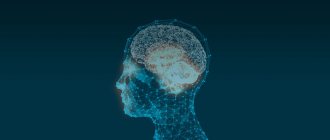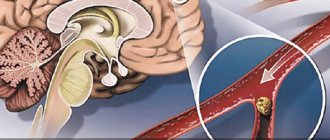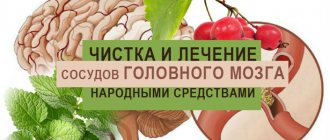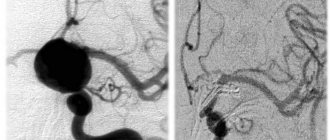Symptoms of weakened blood vessels
If similar symptoms are detected, you need to pay close attention to the condition of the blood vessels:
- Fainting and dizziness;
- Throbbing pain in the back of the head or temples, tinnitus;
- Cold and swollen feet;
- Intolerance to hot weather;
- Dependency on weather;
- Depression, insomnia, fatigue;
- Shortness of breath, tachycardia, constantly changing pressure;
- Hematomas even with a small impact;
- Changeable temperature;
- Nosebleeds;
- Spider veins and pinpoint hemorrhages on the skin;
- Tingling, pain and bruising on the eyeball.
Signs of high cholesterol
For a long time, high cholesterol levels in the blood may not manifest themselves in some people, so after 40 years it is recommended to take a lipid profile once a year.
This is a special analysis that determines the level of triglycerides (fats), total cholesterol, as well as its individual fractions. It turns out that cholesterol can be not only “bad” (as it is in low- and very low-density lipoproteins), but also “good” (cholesterol in high-density lipoproteins). That's why balance is so important. The first symptoms usually appear many years after the onset of atherosclerosis, the deposition of cholesterol plaques in the arteries. This process can lead to the development of coronary heart disease, heart attack, stroke, and damage to peripheral arteries. Manifestations such as shortness of breath, chest pain, loss of coordination, changes in speech, etc. indicate an advanced pathological process. But the most important thing in maintaining health is to take care of your body in advance (before organic changes develop). Comprehensive prevention aimed at eliminating the cause of increased atherogenicity of blood plasma is important.
How to strengthen blood vessels?
Most doctors suggest that patients not only take medications, but also change their lifestyle. It is worth giving up bad habits (smoking and alcohol), changing your physical activity regime (try not to sit still, but also not overloading yourself with exercise), resting, avoiding nervous shock and sticking to proper nutrition.
Medicines are the main way to correct the condition of blood vessels. With proper treatment, you can achieve good results in strengthening the walls of blood vessels or reduce the risk of problems with them in the future.
The healthiest foods for the human brain
The brain is one of the most complex organs of the human body. Without it, neither mental work nor normal physiology is possible. Its functioning requires a variety of amino acids, polyunsaturated fats Omega 3 and Omega 6, vitamins (especially vitamins E and C), water and many other substances and compounds.
The most beneficial foods for the brain
Sea fish and seafood are an essential component of the diet, aimed at improving the functioning of the brain and the entire nervous system. Phosphorus, iodine, minerals, Omega-3 fatty acids help the brain maintain efficiency and youth. They affect the reduction of the level of “bad” cholesterol, cleansing the walls of blood vessels from fatty plaques, and actively saturating brain cells with oxygen and nutrients.
Eggs. The yolk of an egg contains choline, which nourishes brain cells and neurons, without which they cannot form and exist. If you eat eggs regularly, it is enough to eat 1-2 eggs a day.
Milk. Milk is necessary for the brain because it contains tryptophan, a substance that is a source for the synthesis of serotonin, the hormone of joy. In addition, the antioxidant glutathione, which researchers recently discovered in milk, improves neuronal function and helps maintain sanity into old age.
Cereals. Oats, wheat, barley, brown rice and bran from them contain a lot of folic acid and thiamine, that is, vitamin B6. Thus, porridge and whole grain bread are useful not only as a means of improving metabolism, but also as an excellent stimulator of blood circulation and improvement of brain activity.
Nuts. Seeds and nuts are used both as an independent snack and as an additional ingredient in dishes. They contain everything that brain cells need: vitamins E and B; folic acid; Omega-3 and Omega-6 fatty acids, etc., minerals, including magnesium and potassium. Nuts such as almonds, walnuts, cashews, peanuts, hazelnuts, pecans, and all types of seeds nourish the brain, provide a lot of energy, improve memory, elevate mood, and even reduce signs of depression.
Green and leafy vegetables, herbs. Greens contain so many vitamins important for mental activity that even a single loading dose can help: remember or remember a large amount of valuable information; increase the productivity of mental activity; relieve fatigue. Greens owe these results to a large amount of B vitamins and folic acid.
Berries. Vitamins, sugars, fiber, antioxidants, flavonoids from berries help with heavy mental stress, improve coordination and memory, preserve youth and increase cell performance.
Dried fruits. The rich vitamin and mineral composition makes dried fruits an essential product for those who want their head to work quickly and well. Dried apricots, raisins, prunes, figs, dates and other dried fruits and berries reduce the level of “bad” cholesterol in the blood, cleanse the blood vessels of the brain from cholesterol plaques, improve memory and concentration, and help maintain good coordination.
Honey. Honey is a recognized healer of the cardiovascular and nervous system. With constant mental work, it is definitely needed in the diet as a means of cleansing the blood and blood vessels from “bad” cholesterol and improving cerebral circulation.
Tea. Both black and green teas contain catechins. These unique substances help improve brain activity, remember information well, relax, and restore strength faster. It is better to drink tea in the morning and afternoon.
Turmeric. Turmeric is useful for the brain because it can relieve inflammation in brain tissue, restore neurons, destroy sodium benzoate, which interferes with connections between brain cells, act as an antioxidant that protects cells from aging, and give a positive mood due to the production of the hormones dopamine and serotonin.
Ginger. A spice with a pungent taste and fresh aroma is very beneficial for the heart, blood vessels and brain cells. Ginger is used as a blood thinner, improves cerebral circulation, and with regular use significantly improves memory, preventing the development of Alzheimer's and Parkinson's diseases.
Lemon. The value of lemon for the brain is associated primarily with its high content of vitamin C, potassium, magnesium and other minerals. Lemon helps cleanse blood vessels of cholesterol build-ups, prevent fatigue and relieve stress.
Plain water. The brain cannot function normally without sufficient fluid in the body. Often, a feeling of chronic fatigue and drowsiness are signs of a lack of moisture in the body. The best way to replenish fluid reserves and thereby protect the brain from dehydration is to drink regular drinking water: it is best absorbed without carrying additional calories, such as fruit juice.
What increases blood cholesterol
Cholesterol levels can be increased by poor nutrition and problems with the liver, where resynthesis of this substance occurs. The most dangerous products are recognized:
- fatty meats, chicken skin, offal, sausages and semi-finished products;
- Trans fats are chemically modified vegetable oils that are given the appearance of butter (margarine). There are especially many trans fats in confectionery products;
- fatty types of dairy products - you should not refuse such food, it is important to follow the recommended standards;
- fried foods – heating oil to extremely high temperatures leads to the formation of trans fat and carcinogens;
- easily digestible carbohydrates in rice, sweets, soda, breakfast cereals, etc. – they provoke inflammatory reactions in the body from the blood vessels, thereby increasing the atherogenicity of the plasma;
- Coconut oil is a leader in the content of saturated fats, which lead to an increase in “bad” cholesterol.
To minimize the risks of atherosclerosis, it is important to adhere to a diet, excluding harmful foods from the menu.
Any conditions that negatively affect the liver also alter cholesterol metabolism. Increase the likelihood of developing atherosclerosis:
- liver dysfunction;
- hepatitis;
- fatty liver;
- alcohol abuse;
- work in chemically hazardous production;
- inhalation of household chemical vapors, etc.
If possible, as part of prevention, you should adhere not only to diet menus, but also protect the liver from adverse internal and external influences.
To begin with, we will talk about drugs that affect the condition of blood vessels, and below we will give examples of products that can lower the content of “bad” cholesterol.
Causes of high cholesterol
Approximately 80% of cholesterol in the body is synthesized in the liver, the remaining 20% comes from food. If this balance shifts in one direction or another, an increase in the atherogenic index is possible.
Increased levels of cholesterol in the body are usually associated with the following predisposing factors and circumstances:
- overweight and obesity, with waist size playing a special role, because indirectly reflects the amount of abdominal fat in the body (the norm for this indicator for women is up to 88 cm, and for men – up to 102 cm);
- eating fatty foods - we are talking mainly about animal fats, which are rich in saturated fatty acids (the daily diet should contain up to 15% fat, but most of it should be in the unsaturated fraction - vegetable oils, seafood and fish);
- sedentary lifestyle - the less a person moves, the higher the likelihood of “bad” cholesterol attaching to the walls of blood vessels and an increased risk of atherosclerosis;
- age 50+ - women who have entered menopause are especially at risk, because during reproductive age, estrogens had an additional protective effect on blood vessels, but men are also vulnerable, so prevention is important for both sexes;
- complicated heredity - if immediate relatives suffered from atherosclerosis or early strokes/heart attacks, you should regularly check the level of cholesterol in the blood and, if the concentration is elevated, even in the absence of clinical signs, follow a diet and more;
- smoking (passive and active) – the vascular wall is damaged by both nicotine and combustion products.
Obviously, age and heredity cannot be influenced - these are non-modifiable risk factors. However, all the others can be influenced to reduce their adverse effects to a minimum. This is what prevention is all about. Proper nutrition, quitting smoking and physical activity (at least 30 minutes of walking a day) will help blood vessels function normally.
Vitamins for the heart and blood vessels
A strong heart and strong blood vessels are the key to a long and fulfilling life. Young people pay little attention to the state of their cardiovascular system and only grab their heads when illness strikes. The human heart copes with incredible stress every day. Due to the frantic pace of life, stress, and poor nutrition, the circulatory system is weakened and filled with waste and toxic substances. Vitamins for the heart and blood vessels are needed not only by the elderly, but also by young people. Taking vitamin supplements is a sure way to maintain health and prolong life.
Causes of heart pathologies
According to statistics, heart disease is one of the leaders among human pathologies in terms of disability and mortality. Why are modern people of all ages prone to cardiovascular diseases? The main culprit is an incorrect lifestyle. Representatives of today's youth move little, eat poorly, are often nervous, worried, exposed to stress, chasing success, forgetting about rest. And lack of sleep and excessive stress are the main enemies of the heart. Cardiac pathologies occur as a result of exposure to the following factors:
- high blood pressure;
- obesity;
- sedentary lifestyle;
- bad habits;
- constant stress;
- genetic predisposition;
- lack of vitamins and microelements in the body.
Vitamins and biologically active substances necessary for the heart
In order for the heart to remain healthy, the body must receive optimal amounts of vitamins and microelements. Listed below are the vitamins most essential for the normal functioning of the heart muscle.
- Retinol or vitamin A. A fat-soluble substance that stimulates metabolism and prevents the development of atherosclerosis. Fish oil, milk, and carrots are rich in retinol. Pharmacies sell retinol acetate, a solution for oral administration.
- Ascorbic acid or vitamin C. A water-soluble substance that activates metabolism, destroys bad cholesterol, and strengthens the heart muscle. The vitamin is found in large quantities mainly in plant foods: rose hips, citrus fruits, currants, bell peppers. Ascorbic acid can be used in injections, tablets and dissolving pills.
- Tocopherol or vitamin E. Prevents the oxidation of fats and the formation of free radicals that destroy the tissue of the heart muscle and blood vessels. It is present in significant quantities in liver, nuts, and vegetable oil. The vitamin can be purchased at the pharmacy in capsule form or as a solution.
- Rutin or vitamin P. A water-soluble substance that strengthens the walls of blood vessels, used for pathological bleeding. Citrus fruits, apples, and rose hips are rich in vitamins. In pharmacies, rutin is sold in tablet form.
- Thiamine or vitamin B1. A water-soluble substance necessary for proper contraction of the heart muscle. Cereal porridges contain the most thiamine. To eliminate the deficiency of this vitamin in the body, injections are usually prescribed.
- Pyridoxine or vitamin B6. Destroys harmful cholesterol, normalizes the functioning of blood vessels in the nose, eyes, brain, and activates lipid metabolism. It is present in significant quantities in meat, fish, legumes, and milk. Typically used as pyridoxine hydrochloride injections.
- Vitamin F. Vitamin-like compounds are polyunsaturated fatty acids. Prevents the formation of cholesterol plaques in blood vessels. Fish oil, vegetable oils, fish and seafood are rich in fatty acids.
- Coenzyme Q10. An enzyme that is synthesized in the human liver with sufficient intake of plant and animal products. With a deficiency of the substance, the likelihood of myocardial infarction increases, and the body rapidly ages.
Heart-essential minerals
Certain minerals have a positive effect on the functioning of the circulatory system. Below is a list of the most important minerals for the heart.
- Calcium. Regulates the frequency of contractions of the heart muscle, strengthens the walls of arteries and veins. It is found in significant quantities in fish and dairy products.
- Potassium. Controls nerve impulses that cause the heart muscle to contract. It is present in high concentrations in nuts, dried fruits, potatoes, and cabbage.
- Magnesium. Improves metabolism in cardiac tissues, prevents the formation of blood clots. It is found in large quantities in meat, legumes, and fish.
- Phosphorus. Participates in the formation of cell membranes. Regulates muscle contractions and nerve signal transmission. It is present in significant quantities in bran bread, green beans, and dried fruits.
Vitamins beneficial for brain vessels
Due to poor blood circulation in the brain, strokes often occur. And after a stroke, a person experiences problems with memory, visual and speech function. For your brain to function properly, you need to take vitamins regularly. Below is a list of substances important for the blood vessels of the brain.
- Thiamine or vitamin B1. Improves memory, helps to absorb information faster. Vitamin deficiency causes insomnia, frequent fatigue, problems with coordination of movements, and depression. To replenish thiamine in the body, you should eat fish, meat, nuts, eggs, and oatmeal.
- Riboflavin or vitamin B2. Provides brain tissue with energy, helps cope with high intellectual and physical stress. If there is a lack of the substance, a person becomes drowsy and distracted, his appetite worsens and headaches occur. Meat and dairy products are rich in vitamins.
- Nicotinic acid or vitamin B3. Stimulates energy synthesis in the body, normalizes the functioning of blood vessels in the eyes, nose and brain. It is present in large quantities in liver, meat, legumes, fish, nuts, and eggs.
- Pantothenic acid or vitamin B5. Controls the transmission of nerve impulses and supports mental performance. With a deficiency of the substance, depression, insomnia, and chronic fatigue are noted. Milk, liver, and cabbage are rich in vitamins.
- Pyridoxine or vitamin B6. Restores nerves, strengthens brain vessels. With a lack of the substance, a person becomes hot-tempered and anxious, he experiences depression and sleep disturbances. The vitamin is present in significant concentrations in cereals, liver, legumes, and nuts.
- Folic acid or vitamin B9. Improves thinking ability. With vitamin deficiency, memory deteriorates, apathy and weakness are noted. The substance is rich in nuts, cereals, mushrooms, meat, and fresh plant products.
- Cyanocobalamin or vitamin B12. Regulates the change in phases of sleep and wakefulness, increases brain activity. With a lack of the substance, depression, tinnitus, decreased intellectual abilities, nervousness, visual and memory impairment are noted. The vitamin is present only in animal foods and some algae.
Strengthening the blood vessels of the extremities
The main problem of the blood vessels of the legs is varicose veins. This is an extremely unpleasant disease, in its advanced form manifested by swelling of the knees, legs and feet, inflammation and darkening of the skin of the lower extremities.
To strengthen the blood vessels of the arms and legs, it is necessary to take vitamin complexes supplemented with iron, zinc and calcium. Elimination of varicose veins is carried out through complex therapy. The doctor prescribes therapeutic exercises, physiotherapeutic and water procedures, and medications to the patient. A sick person should not stand or sit in one position for a long time, consume a lot of salt, coffee, black tea, and alcohol. To successfully get rid of the disease, you must adhere to a diet and monitor your body weight.
Strengthening eye blood vessels
If the eyes hurt and hurt, and blood streaks are noticeable on their surface, then we can talk about weakening of the eye vessels. The blood vessels of the eyes are weakened under the influence of the following factors:
- allergies;
- long periods of time at the computer;
- bright sun and harsh wind;
- insomnia;
- changes in blood pressure;
- intense physical activity.
To prevent blood vessels in the eyes from bursting, it is necessary to take B vitamins and ascorbic acid. For severe vascular pathologies of the eyes, it is recommended to administer rutin intramuscularly. Fresh fruits and vegetables, green or rosehip tea are beneficial.
Products to strengthen blood vessels and improve heart function
To keep your cardiovascular system healthy, you need to include the following foods in your diet.
- Olive oil. A high-quality first-press product is rich in unsaturated fats and antioxidants, which cleanse blood vessels of harmful accumulations. With regular consumption of olive oil, the concentration of bad cholesterol in the blood is greatly reduced.
- Dried apricots. Dried apricots contain large quantities of natural antioxidants that protect heart cells from toxins and breakdown products. Dried apricots contain potassium, which prevents the development of a heart attack.
- Fish. Rich in substances that strengthen the walls of blood vessels. Useful for arrhythmia.
- Nuts. They contain arginine, an amino acid that has a beneficial effect on the heart. Regular consumption of nuts significantly reduces the likelihood of a heart attack.
- Dark chocolate . A high-quality product contains flavonoids - pigments that dilate blood vessels, helping to eliminate hypertension. It should be noted that chocolate has no effect on people with low blood pressure.
- Grape. Contains significant amounts of antioxidants and heart vitamins. High-quality grape wines also contain antioxidants. However, you should not abuse alcoholic beverages, otherwise the harm will outweigh the benefits.
Who is recommended to take vitamins for blood vessels and heart?
Many people begin to take care of the circulatory system only when it becomes ill. By supporting and protecting the heart and blood vessels, you can not only cure dangerous pathologies, but also prevent their occurrence. Which groups of people need vitamins for the heart and blood vessels?
- Patients suffering from vascular diseases of the brain and limbs.
- Athletes.
- Children and teenagers.
- People over 50 years old.
- Patients who have undergone heart surgery.
- People doing heavy physical work.
- People working in hazardous workplaces.
People belonging to the categories listed above should definitely contact a cardiologist. The doctor will select the optimal complex of vitamins and minerals. The dosage of the drug and the duration of the therapeutic course are determined by the medical specialist, focusing on the age and well-being of the patient.
Be healthy!
Doctor-hygienist
Gapanovich Valentina,
Diet for high cholesterol
To improve cholesterol balance in the body, it is important to eat right. The body should receive healthy foods and not harmful ones. They allow you to increase the proportion of high-density lipoproteins (“cleaners” of blood vessels) and reduce the proportion of low-density lipoproteins (atherogenic enemies). There are 3 classes of substances that must be present in the diet:
- Omega-3 polyunsaturated fatty acids, which are especially rich in fatty sea fish, avocados, and natural (unfried) vegetable oils.
- Hycosides – These can be found in grapefruit.
- Flavonoids contained in apples.
Now let's learn more about how to try to protect blood vessels using proper nutrition, and what you should include in your menu.
Avocado
This vegetable contains a lot of omega-3 acids, in particular eicosapentaenoic and decosahexoenoic acids. These substances prevent the negative effects of oxidative stress, which triggers the aging process. Omega-3 acids help neutralize free radicals that damage blood vessels. But it is precisely to the sites of damage that cholesterol molecules rush, trying to “patch up” the resulting holes. But instead of benefit, they only bring harm - over time, the cholesterol plaque can significantly increase in volume and lead to blockage of the feeding vessel.
In addition, avocados consumed as part of the diet are rich in potassium. By competing with calcium for binding sites, this mineral prevents the deposition of calcium salts, which make blood vessels fragile (elasticity decreases).
Fatty sea fish
This diet product is rich in unsaturated fatty acids, which are essential for the normal functioning of the heart and blood vessels. These are healthy fats from which “good” high-density lipoproteins are formed, which protect blood vessels. Sea fish contains a lot of protein and beneficial microelements, especially iodine. Optimal content of the latter is important for proper functioning of the thyroid gland. But it is thyroid hormones that determine metabolic activity. It is already a proven fact that hypothyroidism (decreased thyroid function) increases the risk of atherosclerosis. Therefore, to counter this disease, include fatty sea fish (salmon, trout, mackerel, capelin) in your menu at least 2 times a week to effectively prevent atherosclerosis.
Broccoli
Broccoli is a source of sulforapane. This substance directly prevents the formation of atherosclerotic plaques, so it must be present as part of a hypocholesterol diet.
In addition, broccoli contains a lot of coarse fiber. At the intestinal level it acts as a sorbent. Increasing in volume, it reduces the absorption of harmful substances, including excess cholesterol. In addition, it normalizes intestinal motility. This means that unnecessary metabolites from food have less time to contact the mucous membrane, so there is a greater likelihood that they will exit the body in transit.
Grapefruit
Grapefruit contains glycosides that have a positive effect on the heart muscle and the condition of the internal lining of blood vessels, thereby preventing the development of atherosclerosis. And the presence of vitamin P helps to further strengthen the vascular wall, increasing its resistance to damage. This complex effect, combined with a decrease in blood pressure, occurs with regular consumption of these citrus fruits.
However, you should be careful with grapefruit if you are already taking statins, a special class of drugs that are needed to lower high levels of “bad” cholesterol. These drugs are metabolized in the liver by a special enzyme system. And some substances in grapefruit can temporarily inactivate this enzyme, which increases the likelihood of side effects from taking statins. Therefore, ask your doctor in advance whether the metabolism of the drug changes when used simultaneously with grapefruit.
Apples
Apples are a real storehouse of flavonoids. They set cholesterol metabolism in the body in the right direction, reducing the risk of coronary heart disease and other cardiac pathologies. It is recommended to eat 2-3 apples a day. Don't forget about calories. If you are watching your weight, then as part of your diet you should choose sour or sweet and sour varieties.







